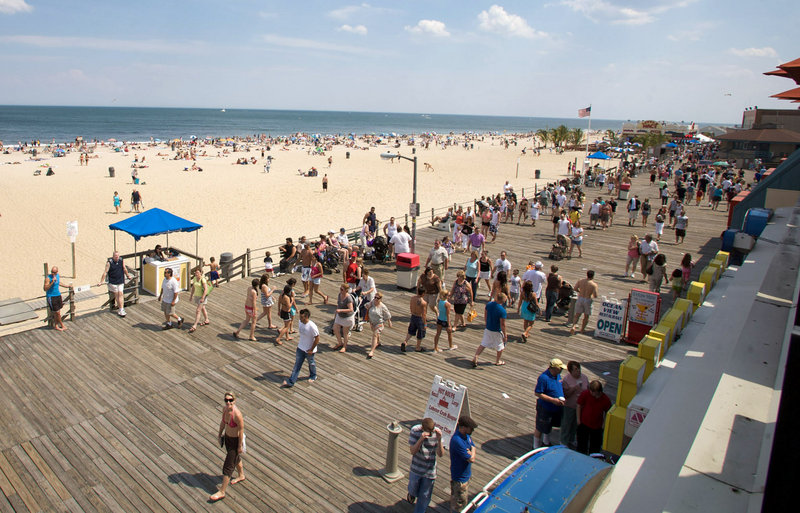POINT PLEASANT BEACH, N.J. – For Dave Cavagnaro, life as a full-time resident along the New Jersey shore came with small headaches he expected: scant weekend parking, congestion and the occasional piece of litter.
Nothing prepared him for what is going on these days in his hometown of Point Pleasant Beach, about 90 minutes by car from Manhattan. Public urination. Beer bottles tossed on his lawn. Screaming crowds pouring onto his street after the 2 a.m. bar closing. He’s even caught a couple having sex against the side of his house.
The town, which has 5,000 year-round residents and as many as 50,000 tourists a day in the summer, is seeking to shut bars at midnight. The move highlights a long-running tension on New Jersey’s 127-mile coastline: its pleasures put some locals and tourists at odds. Nearby Sea Girt, Belmar and Spring Lake all imposed earlier bar closings in recent years to control unruly behavior immortalized in the MTV reality show “Jersey Shore.”
“People say ‘Why’d you move so close to the boardwalk and to the bars?’ but it wasn’t always like this,” Cavagnaro, 63, a retired French teacher, said during an interview in his home on Parkway, about three blocks from the boardwalk.
“Crowds, tourists and the occasional garbage I expect,” Cavagnaro said. “I don’t expect that when I go to bed at night I have to worry about the safety of myself and my house.”
A town ordinance that was set to take effect July 1 would have ordered midnight closings or forced establishments to pay a fee for staying open later to defray the cost of additional police. The state’s liquor regulator on June 29 blocked the law while bars challenge it in court.
“Should the appellants prevail after a full hearing, there is no method of redress for them to recoup the financial losses they would incur,” Michael Halfacre, director of the state Division of Alcoholic Beverage Control, wrote in his decision. “I am also convinced that the ordinance in question has the potential for a negative ripple effect on other endeavors and enterprises in and outside of the borough.”
The beach and the 14-week summer season that brings out-of-towners to Point Pleasant’s cottages, some that rent for as much as $4,500 a week, have been lucrative for the town. A 2007 study found tourism generated $11.8 million of annual revenue for the borough, more than six times the $1.9 million it cost to support the industry.
Still, year-round residents shouldn’t have to shoulder the expense of policing and cleaning the town’s boardwalk area, said Mayor Vincent Barrella, who is seeking an emergency appeal of Halfacre’s decision. The behavior threatens Point Pleasant’s reputation as a family-friendly resort, he said.
The town, which has an annual budget of $13 million, has to add 88 police officers to its 21-member force in the summer at a cost of $398,000, plus spend another $57,000 on seasonal parking enforcement officers, Barrella said. Last July, the borough council approved $95,000 for increased patrols that will be applied to this year’s property-tax bills, he said.
Cavagnaro said tourists’ behavior has devolved during his 12 years as a resident. In recent years, he’s had a glass door panel broken and two concrete lions stolen off his front lawn. He said a neighbor awoke in the middle of the night to find intoxicated visitors in his pool. He keeps seeing naked people.
Along Niblick Street, where Barrella lives, crushed red plastic cups and empty cigarette packages sit in the gutters in front of homes with tidy lawns.
Bar patrons relieve themselves on private property so frequently that the borough was forced recently to amend its public-urination ordinance to include defecation, Barrella said. He called 2011 a “bad summer’ and said the community is seeking to avoid a repeat. The town has banned most on-street parking near the beachfront bars between midnight and 6 a.m.
“It’s only 5,000 people, but it’s a permanent population and this is our home,” Barrella said in a telephone interview.
Barrella and Marilou Halvorsen, marketing director for Jenkinson’s Boardwalk, both said they don’t expect the issue to be resolved until after the summer.
Jenkinson’s, the borough’s largest taxpayer, is a private company that owns most of Point Pleasant’s 1.5-mile boardwalk and employs 16 percent of its wage-earners.
Halvorsen said rental-house parties, not the bars, are the source of many of the problems, including the trash and the noise.
“When a community is based on tourism, what you do to one business is going to affect all businesses,” Halvorsen said in a July 10 telephone interview.
John “Boe” Siclari, a 49-year-old New Jersey Transit supervisor from Lyndhurst who said he comes to Point Pleasant on most weekends in the summer, had advice for both sides in the dispute: “Everyone needs to lighten up.”
“It’s part of the Jersey Shore and it’s just something that towns on the Jersey Shore have to live with,” Siclari said as he was exiting his car to go to the beach the afternoon of July 9. “Even if they close at midnight, people are going to do the same stuff. It’s not a time thing.”
Send questions/comments to the editors.



Success. Please wait for the page to reload. If the page does not reload within 5 seconds, please refresh the page.
Enter your email and password to access comments.
Hi, to comment on stories you must . This profile is in addition to your subscription and website login.
Already have a commenting profile? .
Invalid username/password.
Please check your email to confirm and complete your registration.
Only subscribers are eligible to post comments. Please subscribe or login first for digital access. Here’s why.
Use the form below to reset your password. When you've submitted your account email, we will send an email with a reset code.